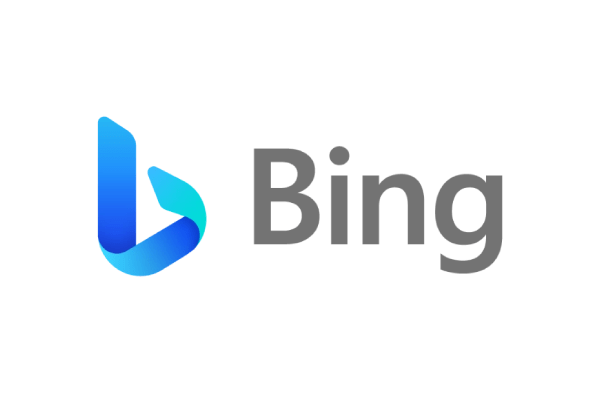Introduction
Bing Statistics: Bing is recognized as the second-largest search engine globally, distinguished by its integration with Microsoft products, which contributes to a greater desktop market share relative to its overall global presence. As of the years 2024-2025, Bing commands a global market share estimated between 3.4% and 3.95%, while in the desktop category, it boasts a significantly higher share exceeding 10% in the United States. The search engine is accessible in more than 100 languages and across 238 regions, experiencing notable growth, particularly following the incorporation of AI technology.
As Microsoft’s designated search engine, Bing has been woven into the fabric of the global search market since its launch in June 2009. For many years, it remained overshadowed by Google; however, Bing’s recent expansion across various devices, user numbers, and revenue streams has been both measured and consistent. The year 2024 marked a further strengthening of Bing’s position, particularly in the desktop arena, further enhanced by AI integrations such as Copilot.
Editor’s Choice
- In an initiative to establish a new identity for Microsoft’s search services, Live Search was officially succeeded by Bing on June 3, 2009.
- Bing, the search advertising platform developed by Microsoft, generated approximately $11.59 billion in revenue during the fiscal year 2022.
- The total number of unique user accounts reached approximately 627.8 million, indicating that 29.61% of Bing’s monthly traffic originates from the United States.
- The report indicates that roughly 32% of Bing users spend more money online compared to the average internet user, with 36% categorized within the top 25% income bracket.
- The user demographic of Bing is primarily male, comprising 63%, while females account for 37%.
- As of September 2023, Bing’s market share was noted at 3.41%, which increased to 3.73% in 2024.
- By April 2025, Bing’s market share had increased to 7.5% for all-device searches in the United States, marking one of the highest levels it has ever achieved in that nation.
- In October 2019, Bing recorded 963.5 million unique visits.
Historical Facts
- In an initiative to establish a new identity for Microsoft’s search services, Live Search was officially succeeded by Bing on June 3, 2009.
- The name Bing was selected through focus groups, with Microsoft determining that it was memorable, concise, and easy to spell, making it suitable for use as a URL worldwide.
- On July 29, 2009, Microsoft and Yahoo! announced a ten-year agreement whereby the Yahoo! search engine would be supplanted by Bing, while maintaining the Yahoo! user interface.
- On July 31, 2009, The Laptop Company, Inc. issued a press release indicating its intention to contest Bing’s trademark application, claiming that Bing could create confusion in the market due to the similarity with their product BongoBing, which also conducts online product searches.
- Microsoft argued that the challenges to its trademark were unfounded, as these companies submitted their U.S. federal trademark applications only after Microsoft had applied for the Bing trademark in March 2009.
- The new index-serving technology, referred to as “Tiger,” has been integrated into Bing globally since August 2011.
- On February 7, 2023, Microsoft commenced the rollout of a significant update to Bing, known as the new Bing.
General Bing Statistics and Facts
- Bing, the search advertising platform developed by Microsoft, generated approximately $11.59 billion in revenue during the fiscal year 2022.
- Each day, an average of around 900 million searches are conducted on Bing.com.
- In 2022, Bing.com attracted roughly 1.2 billion unique visitors from across the globe.
- Bing users represented about 15% of the worldwide population in 2022.
- China comprised 36.17% of all visitors to Bing.com, followed by the United States at 26.25% and Japan at 3.71%.
- As of December 2022, Bing’s web search engine held approximately 9
- % of the global search market.
- In 2021, Bing’s market share in the United Kingdom was about 9.6%.
- As of 2022, Bing’s market share in the United States was approximately 6.72%.
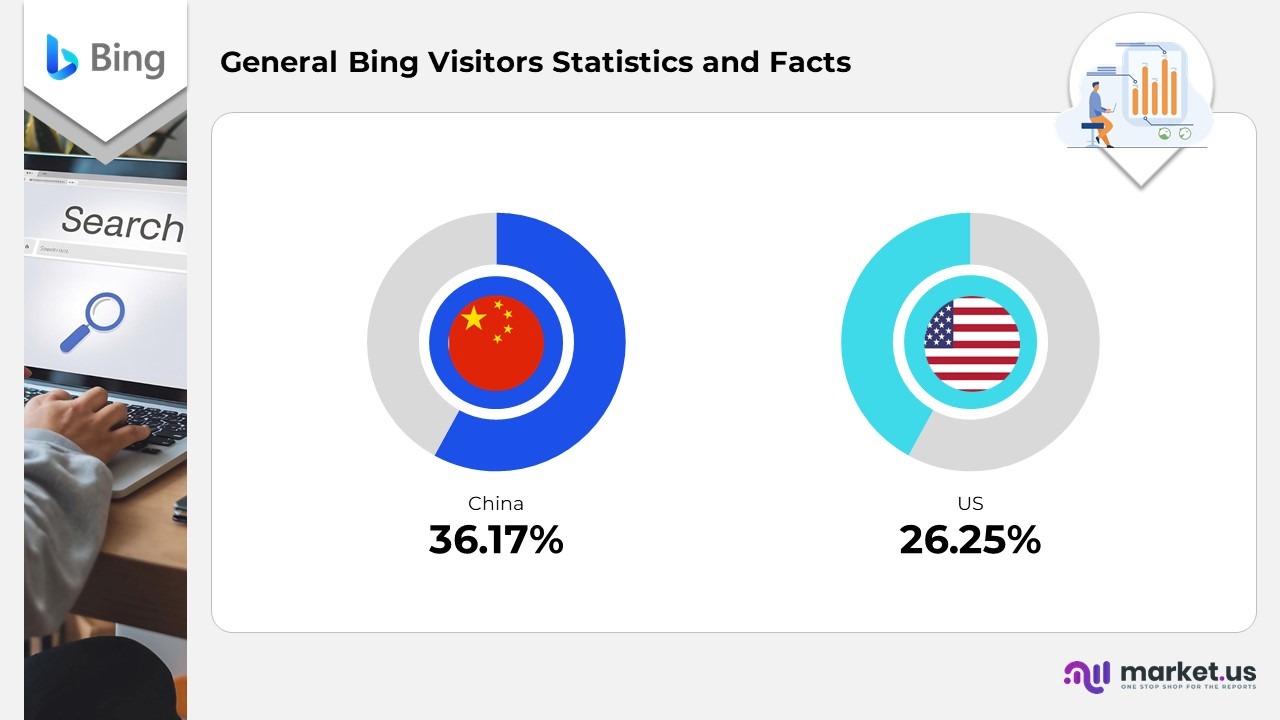
Bing Users by Country Statistics
US
- The total number of unique user accounts reached approximately 627.8 million, indicating that 29.61% of Bing’s monthly traffic originates from the United States.
- One significant factor contributing to this is that Microsoft is an American corporation, and Bing is seamlessly integrated with Windows operating systems, which are widely utilized in the United States.
India
- India represents roughly 250.70 million Bing users, making up about 11.82% of the overall Bing traffic.
Brazil
- Brazil also boasts a considerable number of Bing users, with an estimated 185.40 million users, accounting for around 8.74% of total Bing traffic.
- Brazilians seem to favor Bing for its search result options; specifically, it provides localized search results that align with the preferences of the searchers.
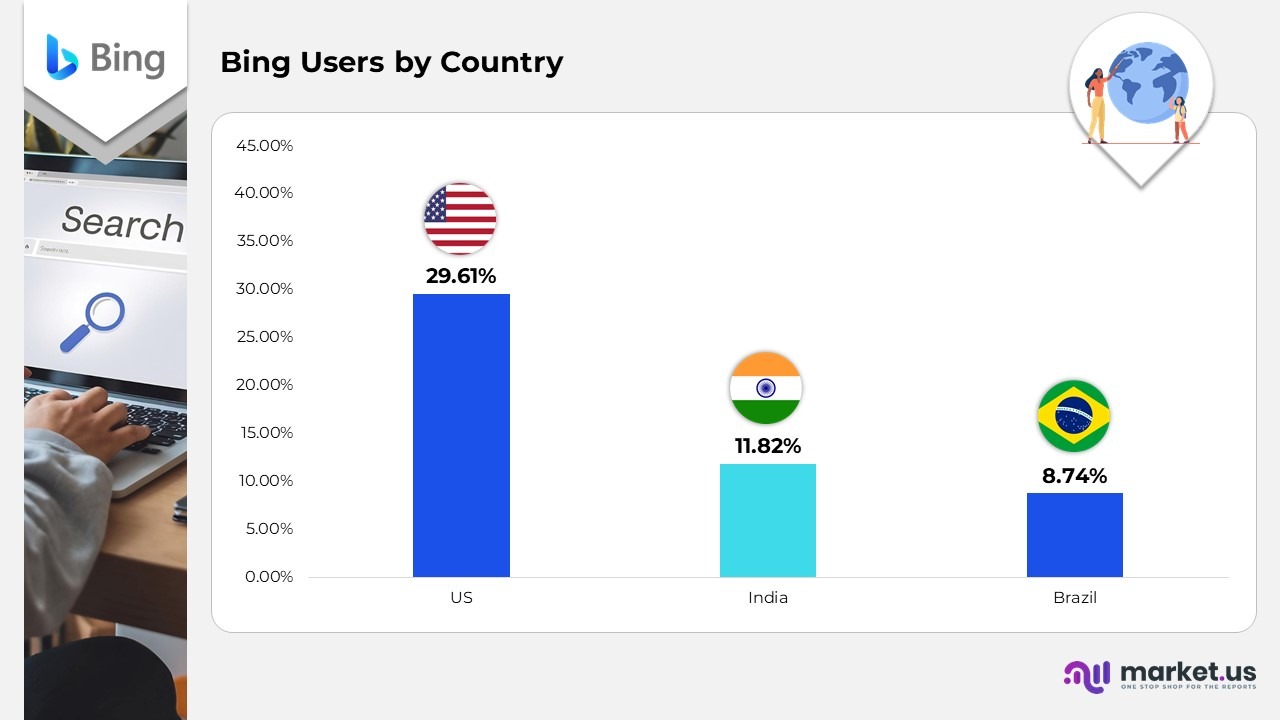
Spending Statistics of Bing Users
- The report indicates that roughly 32% of Bing users spend more money online compared to the average internet user, with 36% categorized within the top 25% income bracket.
- Demographically, about 54% of Bing users are married, and 59% have children living with them.
- Furthermore, 34% of all Bing users hold a college degree, suggesting that the audience is predominantly educated.
- In terms of behavior, 54% of Bing’s users opt for the search engine to perform product research online, which suggests that a significant portion of the Bing audience primarily utilizes the search engine for shopping and product research.
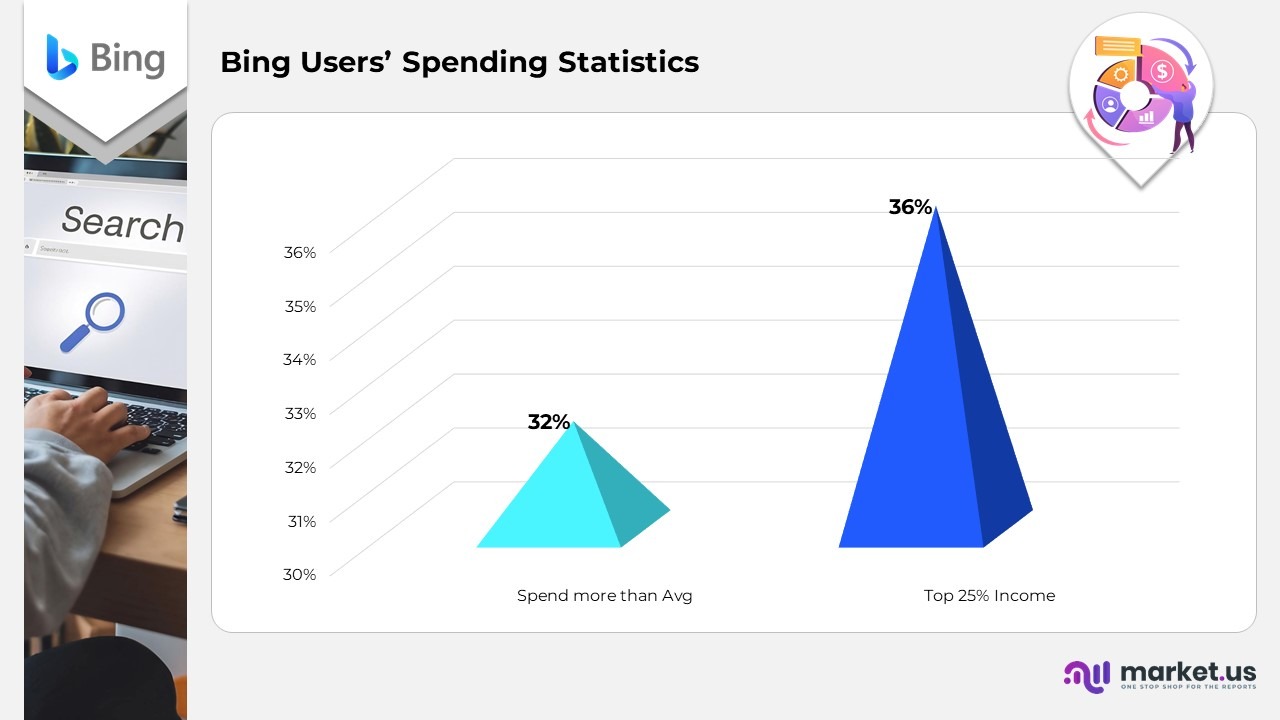
Bing User Demographics
- The largest demographic of Bing users falls within the age range of 25 to 34 years, closely followed by those aged 35 to 44.
- The user demographic of Bing is primarily male, comprising 63%, while females account for 37%.
- Approximately 50% of Bing users belong to the top 25% of household income earners. In the United States, 41% of Bing users have an annual income exceeding $100,000.
- Although recent global statistics are scarce, Microsoft Advertising has previously indicated that a notable proportion of Bing users hold college degrees.
- Bing is predominantly utilized as a desktop search engine. With a desktop market share of 11 to 12% compared to less than 1% for mobile, the vast majority of Bing users are essentially desktop-only searchers.
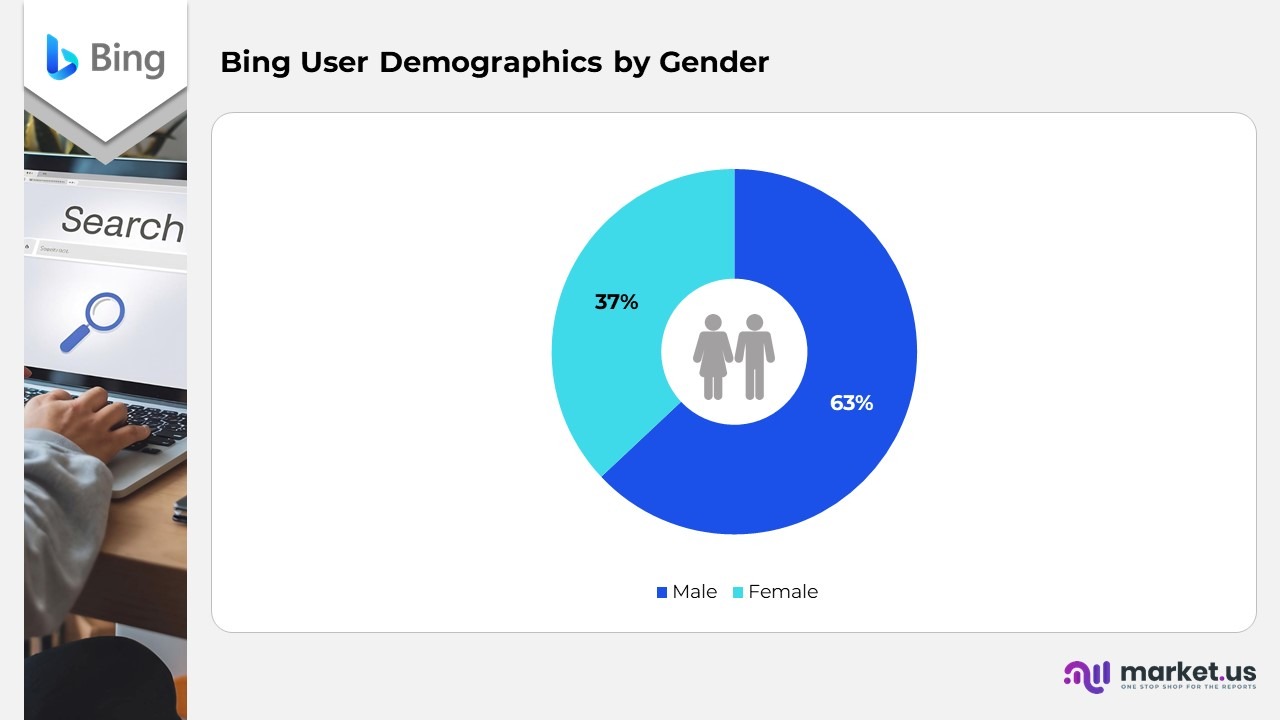
Bing Market Share Statistics
- As of September 2023, Bing’s market share was noted at 3.41%, which increased to 3.73% in 2024.
- A survey shows that 23% of business executives favor Bing over Google.
- Bing’s market search reached its highest point in 2014, achieving a share of 3.63%.
- Research carried out in 2023 indicates that Bing holds a market share of 54.68% among console users, as it serves as the default search engine on Xbox.
- 32% of Bing users are more likely to spend additional money online compared to the average Google user.
- 48% of Bing users are part of the top 25% of household incomes in the United States.
- Bing accounts for 26% of branded searches each month, in contrast to Google.
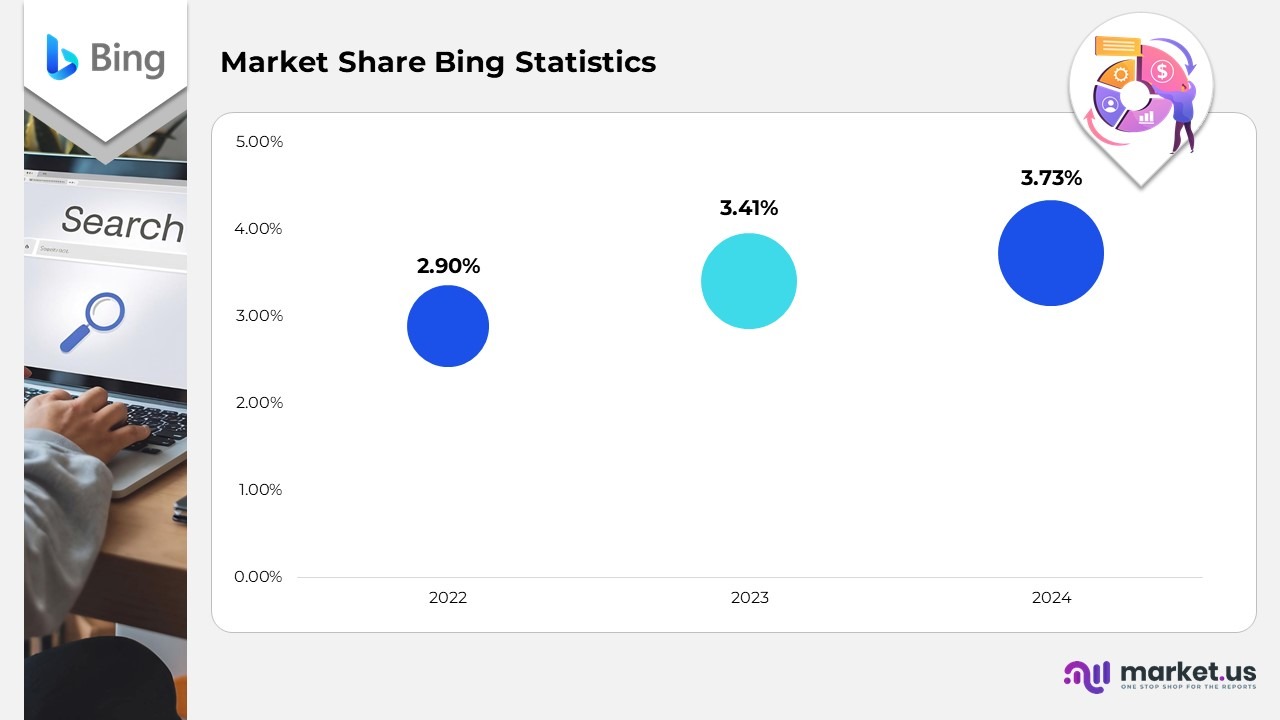
Market Share of Bing Search Engine
- By April 2025, Bing’s market share had increased to 7.5% for all-device searches in the United States, marking one of the highest levels it has ever achieved in that nation.
- From Bing’s viewpoint, the United States ranks among the leading countries in terms of search share.
- While it is experiencing growth in the U.S., China remains the largest contributor, accounting for over 25% of Bing’s global traffic.
- The United States ranks second, contributing nearly 22% to Bing’s overall traffic.
- This indicates that despite Bing’s progress in the U.S., a significant portion of its user base is still from China.
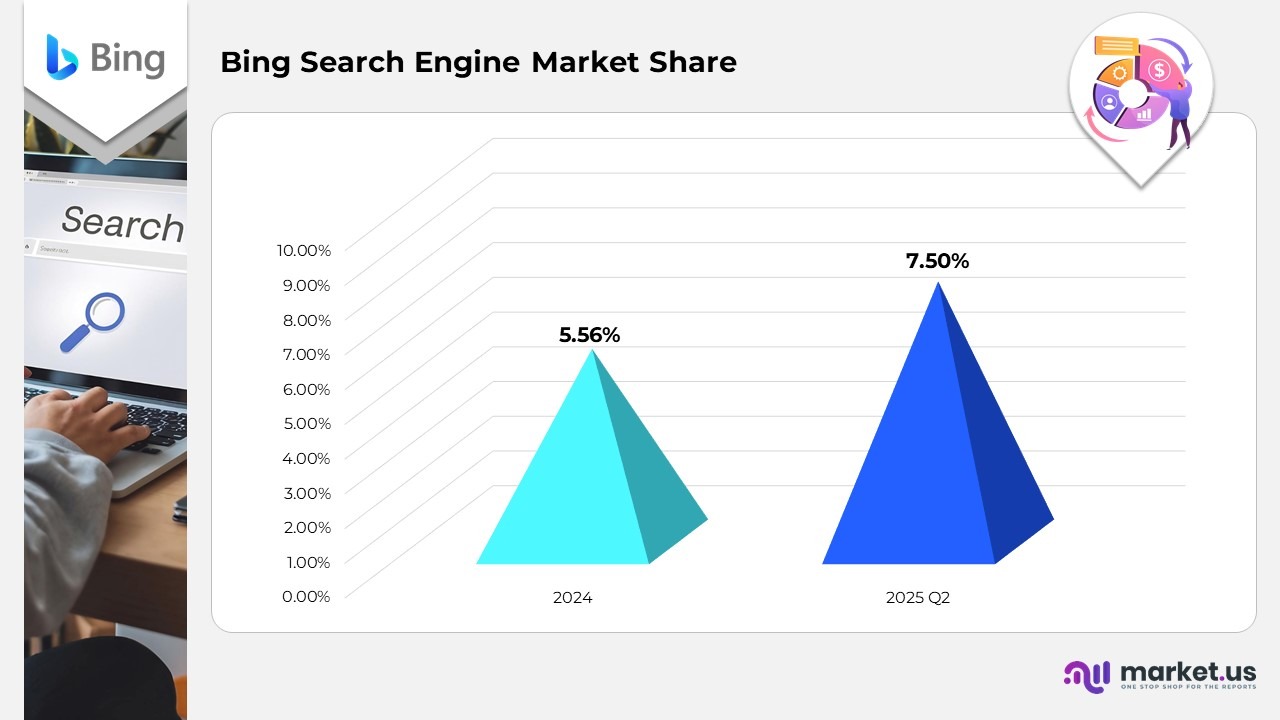
Bing Search Statistics
- In October 2019, Bing recorded 963.5 million unique visits.
- Bing represents 4% of all organic search visits in the United States.
- Statistics from Google search indicate that the leading search engine is significantly ahead of Bing, capturing 92% of all organic search visits. Furthermore, Google holds 95% of mobile organic search visits, whereas Bing only accounts for 1.6%.
- Once again, Google surpasses Bing; the most widely used search engine globally possesses a paid mobile search click share of 74%, combining both smartphone and tablet data.
- 69% of searches conducted on Bing are related to well-known brands and websites.
- Trends for Bing suggest a modest increase in its popularity. Prior to its merger with Yahoo, Bing held 14% of the search market in the US.
- Bing’s global market share stands at 2.32%.
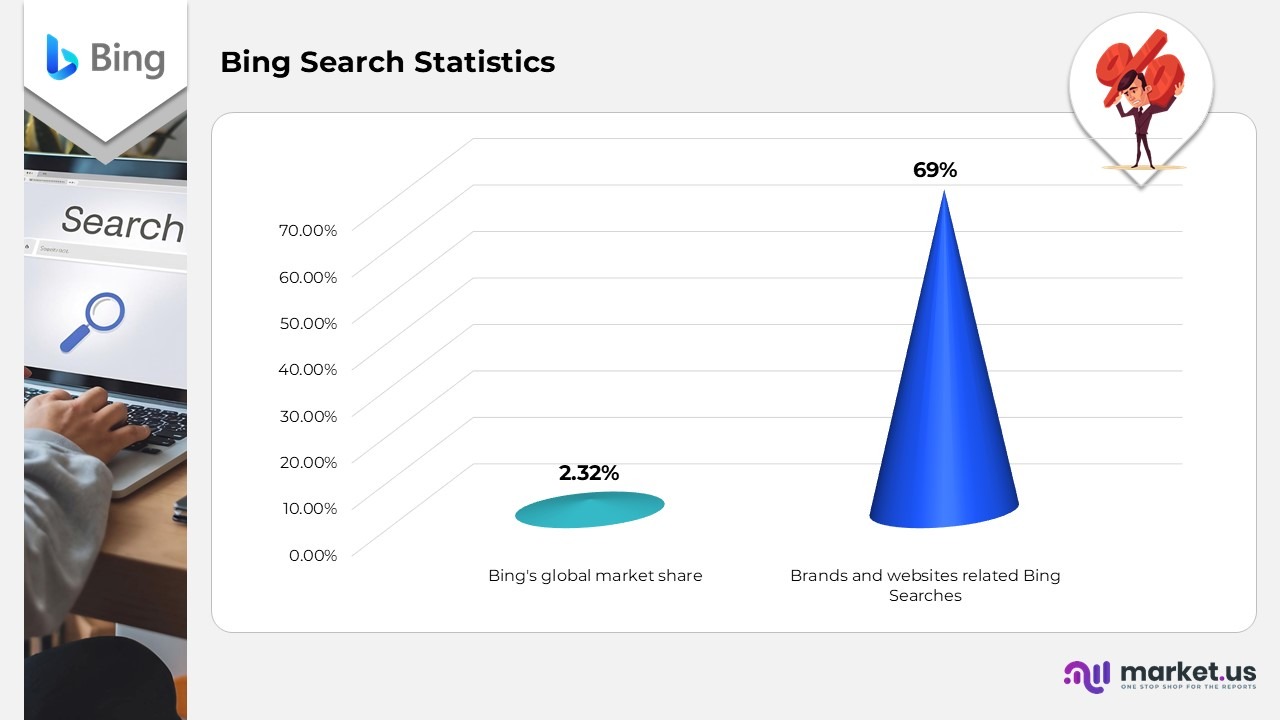
Bing Search Volume Statistics
- Bing manages approximately 13 to 14 billion searches each month (around 450 million daily, or roughly 5,400 searches per second).
- By contrast, Google handles more than 200 billion searches monthly.
- The most frequently searched term on Bing globally is “Google,” with about 40.96 million searches per month (Ahrefs, 2025).
- In the United States, “YouTube” and “Gmail” rank among the leading queries on Bing, in addition to “Google” itself.
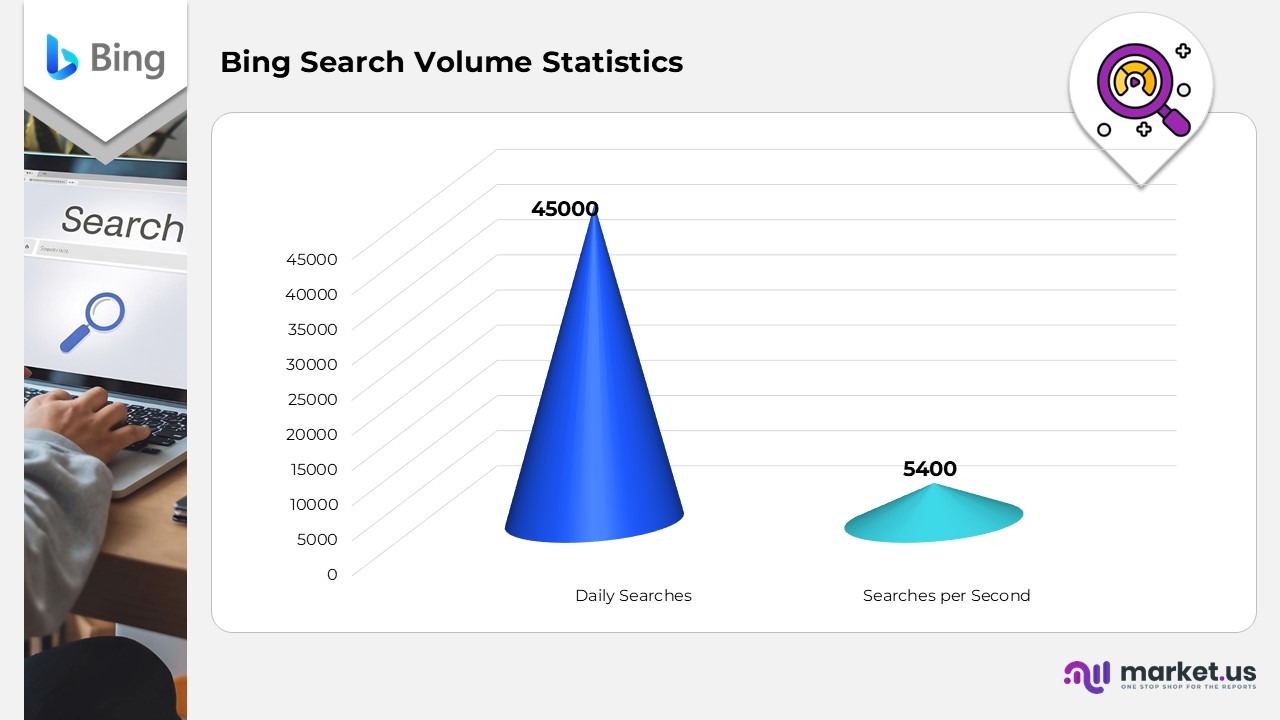
Statistics of Bing Usage
- Bing is the leading search engine in China, boasting a user share of 32.95%, while in the US, it holds 26.24%.
- According to Microsoft, the demographic that predominantly utilizes Bing consists of individuals under 45 years of age, representing 74% of its total user base.
- Among these users, males constitute the largest segment at 55%, while females account for 45%.
- Bing operates in 238 countries and supports 105 languages.
- Although it ranks second, Bing surpasses Google in popularity among desktop users.
- Bing Chat, which utilizes OpenAI’s GPT-4, has surpassed other chatbots such as ChatGPT-3.5, achieving an impressive performance score of 92.4%.
- As reported by Ahrefs, Google remains the most searched website, followed by YouTube, Facebook, Gmail, and Amazon.
- Recent data from Bing indicates that three of the top ten search queries pertain to Google or its services.
- Among Bing’s user base, 34% are college graduates.
- The search engine is particularly favored by users aged 25 to 34, who represent 22.17% of the total, followed by those aged 18 to 34 at 30.7%.
- Bing reports an impressive total of over 900 million searches daily, translating to 27 billion searches monthly, 37.5 million searches hourly, 625,000 searches per minute, and 10,417 searches every second.
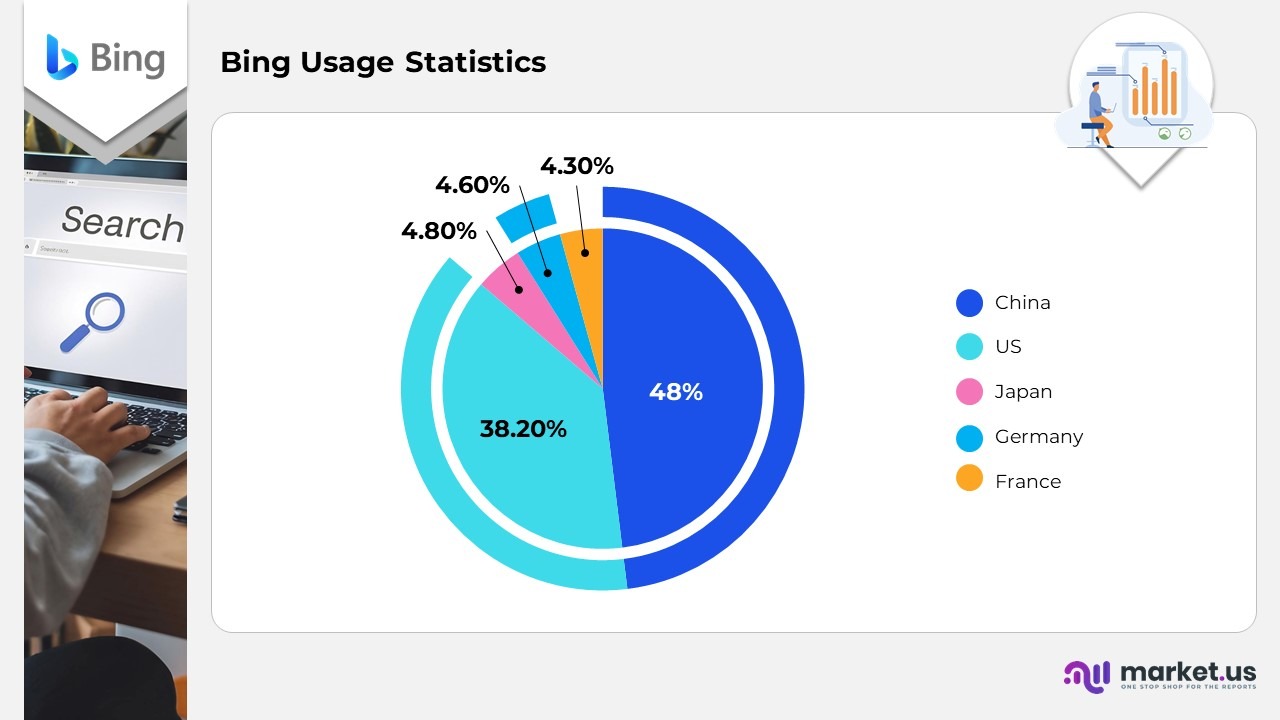
Bing Valuation Statistics
- In 2019, its valuation was approximately US$214 billion, which increased to roughly US$235 billion in 2020.
- By 2021, it was assessed at US$395 billion and stabilized at about US$400 billion in both 2022 and 2023.
- Looking ahead to 2024, a revenue-driven estimate suggests that Bing’s valuation stands at US$12.21 billion, indicating a rather conservative revenue-based assessment rather than reflecting its complete market value.
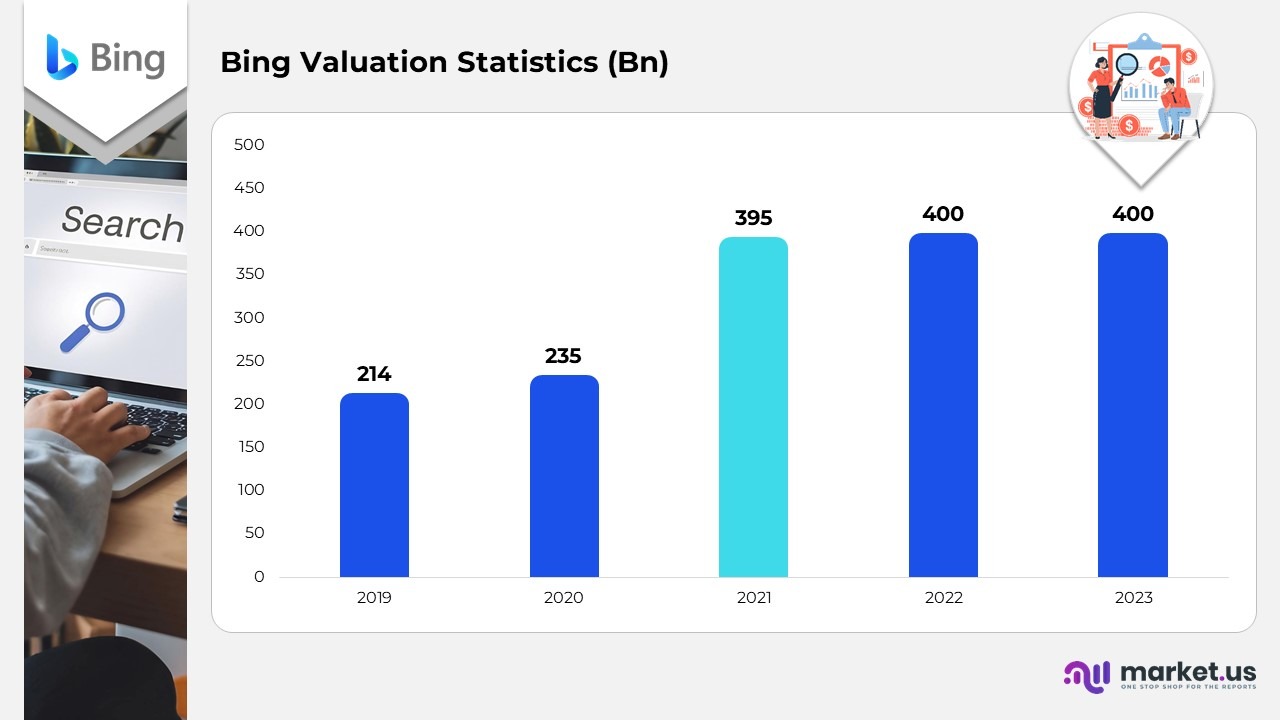
Bing Ads Revenue Statistics
- In 2012, Bing began testing alternative advertisement headlines on its search result pages.
- This minor adjustment, in turn, enhanced users’ perception of ads and resulted in a US$100 million increase in revenue, demonstrating the significant impact that small design changes can have.
- When reflecting on Bing Ads revenue over the years, a clear picture of robust growth emerges.
- Bing’s advertising revenue for 2016 amounted to US$5.43 billion.
- This figure increased to US$6.22 billion in 2017, further rising to US$7.01 billion in 2018, and continued to grow to US$7.63 billion in 2019.
- Revenue peaked at US$7.74 billion in 2020, and in 2021, it experienced a rapid surge to US$8.53 billion.
- In 2022, Bing generated US$11.59 billion in advertising revenue.
- The following year, in 2023, it reached US$12.21 billion.
- For 2024, Bing’s advertising revenue is projected to be approximately US$12.58 billion.
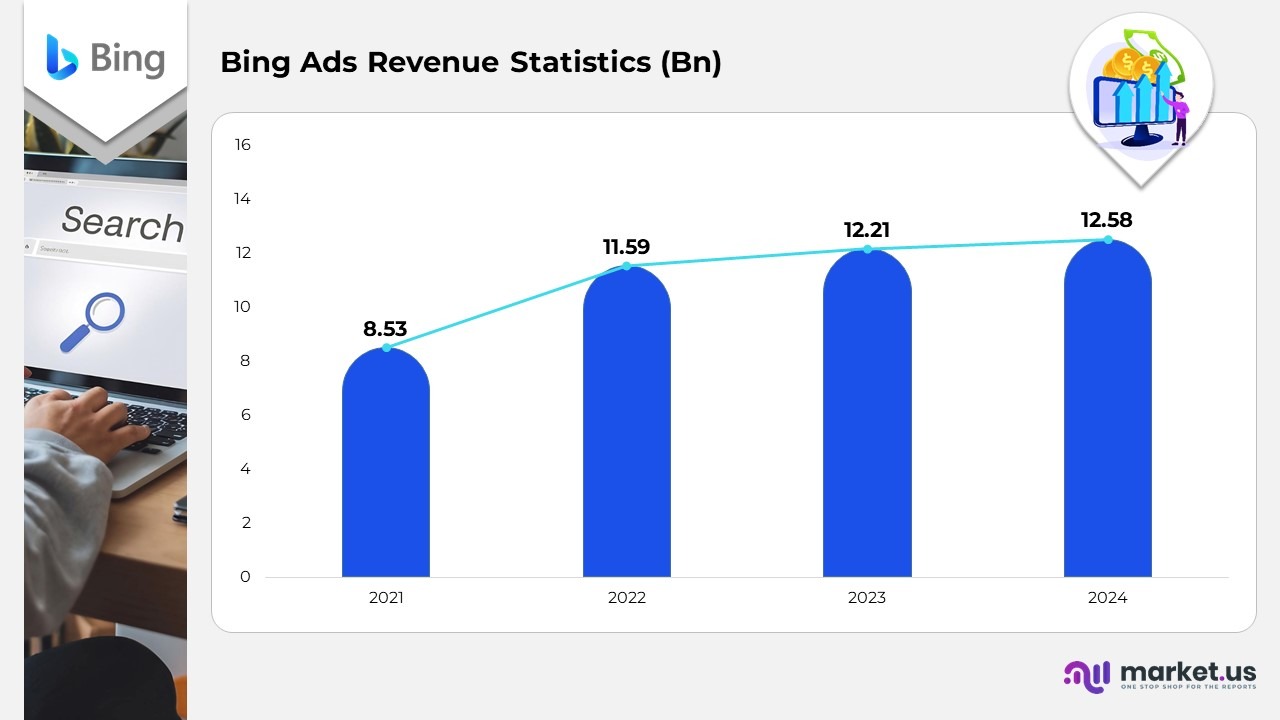
Statistics of Bing Chats
- The notoriously well-known search engine is once again generating buzz as it has recently unveiled Bing Chat powered by ChatGPT, achieving over 100 million daily active users merely one month post-launch.
- Bing Chat reached the impressive milestone of 100 million daily active users shortly after its introduction, indicating that users value the AI-driven chat service.
- Bing introduced the AI chat feature on February 7, 2023, to improve the search experience.
- Every day, more than 100 million individuals utilize Bing Chat.
- Bing Chat recorded 45 million interactions within just weeks of its launch.
- Users can access Bing Chat through the Edge and Bing mobile applications available for both iOS and Android.
- Bing Chat is also referred to by its codename, Sydney.
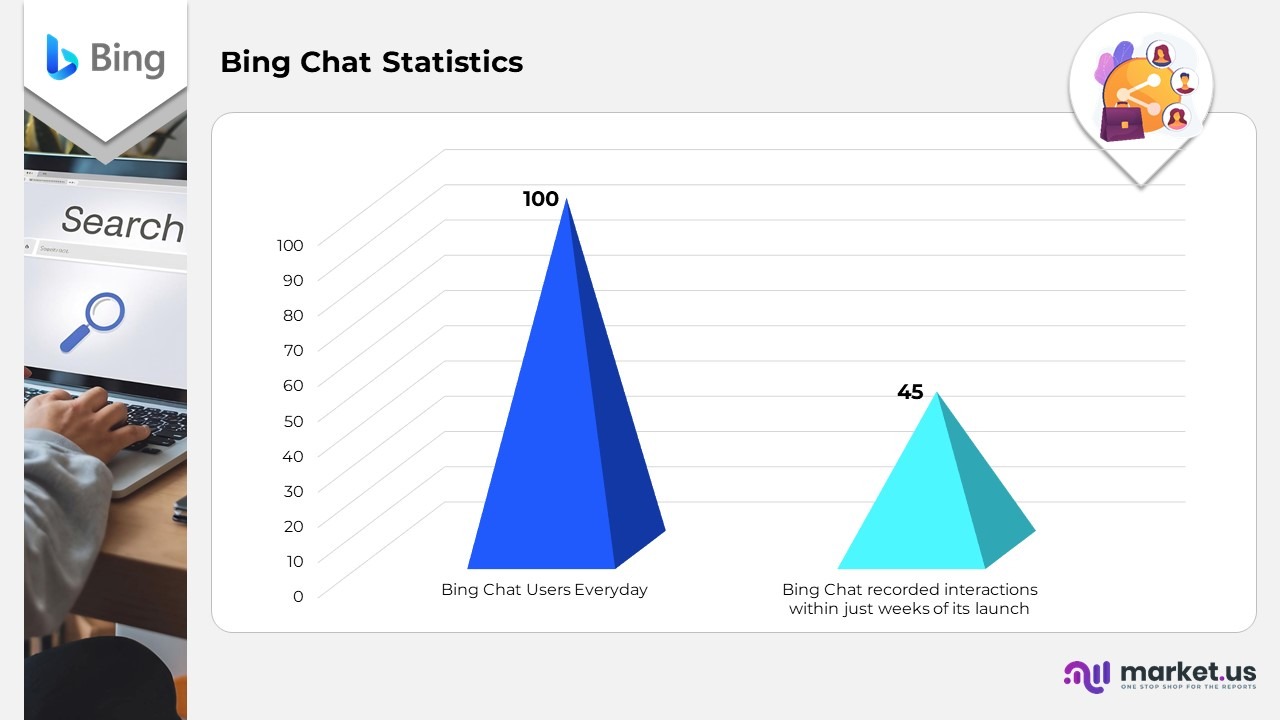
Bing Traffic by Country
- According to a report by Statista, Bing Statistics indicate that in May 2025, the United States accounted for 27.12% of all visits, representing over a quarter of the total traffic.
- During the same timeframe, China was the second largest contributor, making up 14.16% of the overall traffic to Bing.
- Following China was the United Kingdom, with India and Germany closely trailing. However, each of these countries did not exceed 5% of the total web traffic directed to Bing.
- This suggests that the United States and China serve as significant sources of visitors to Bing, while countries like the United Kingdom, India, and Germany contribute a smaller yet noticeable share to the platform’s global usage.
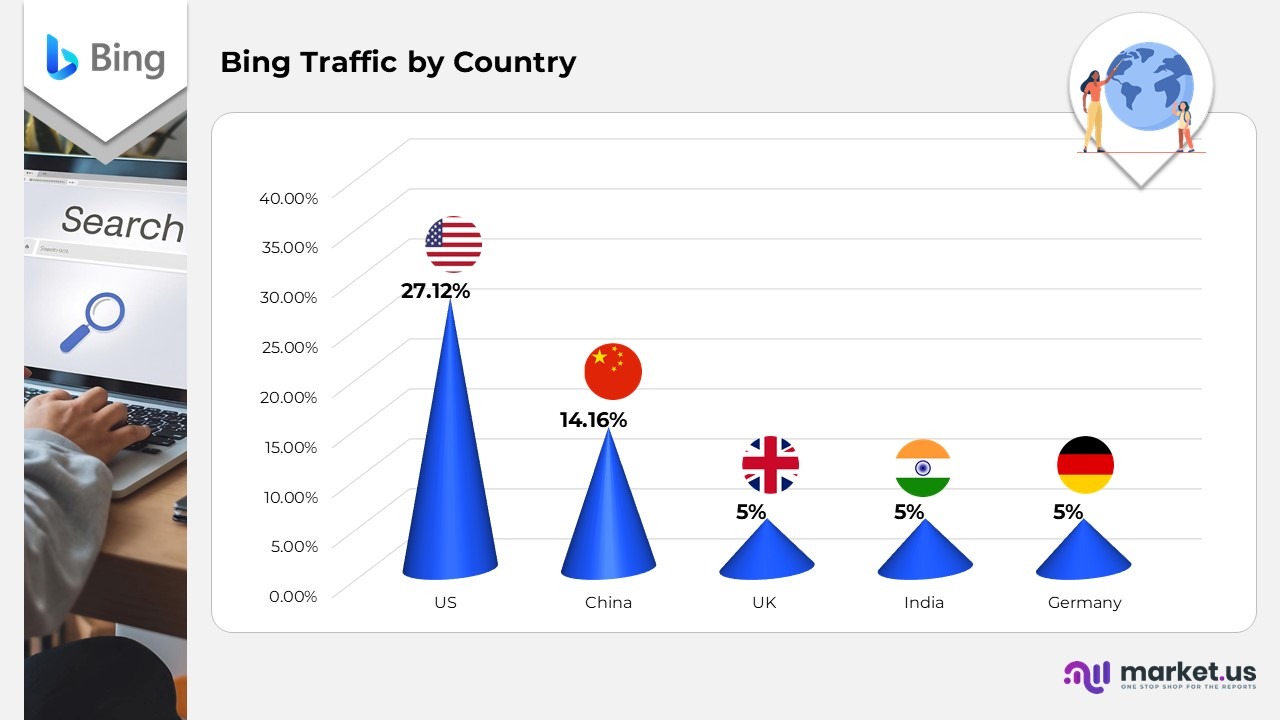
Bing and AI Statistics
- As of 2025, 33 million individuals are actively utilizing Copilot.
- Microsoft has made an investment exceeding €20 billion in artificial intelligence and cloud infrastructure across Europe.
- Bing Chat has achieved an accuracy rate of 81.8%, surpassing both Bard and ChatGPT-3.5, while it is slightly behind ChatGPT-4.
- In April 2025, more than 89 million users accessed Copilot, which is over 20 million more than the number recorded in February of the same year.
- The Bing Image Creator has been employed to produce over 750 million images within the first six months following its launch.
- Approximately 54% of employees utilized Microsoft Copilot via productivity applications in 2024.
- More than 75% of businesses and organizations have reported notable increases in productivity as a result of using Copilot.
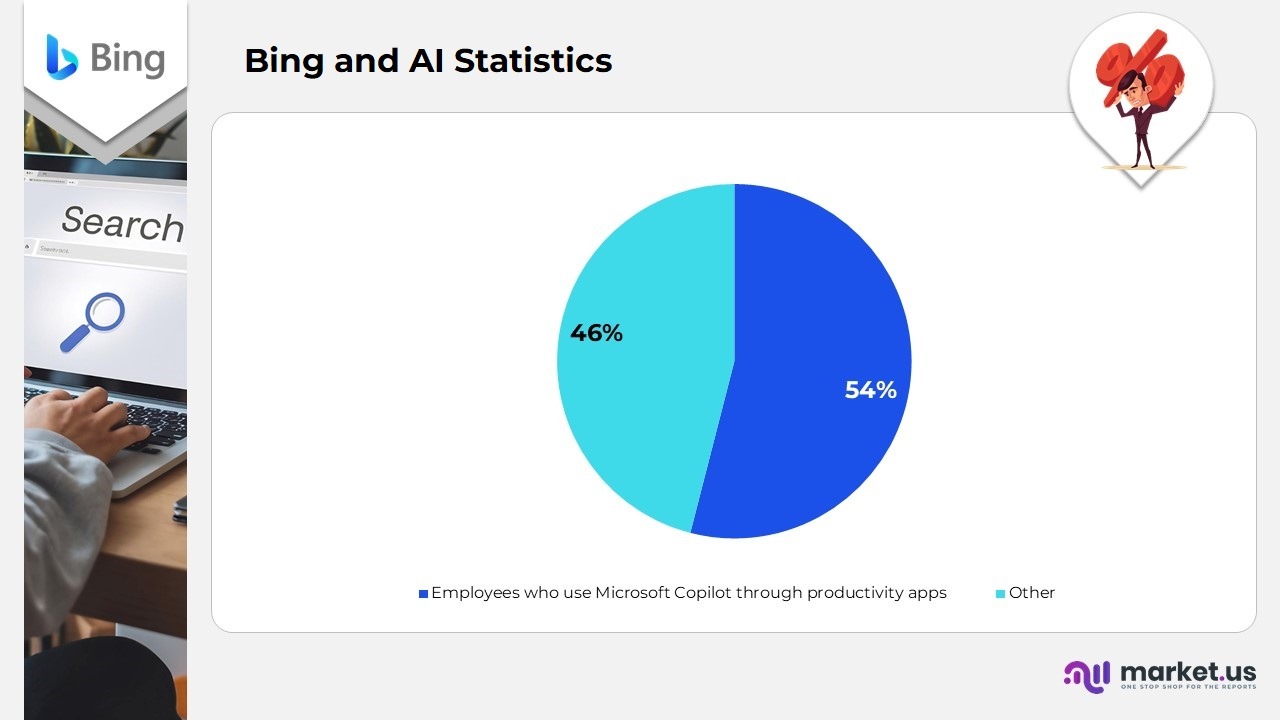
Fun Facts
- 30% to 40% of Bing searches focus on travel, cars, health, and finance topics, areas where users spend more time browsing.
- Bing users tend to be older, with 71% aged 35 or older, and have a higher median age (45 years) compared to Google users.
- Bing users spend 35% more money online than Google users, indicating a smoother search demographic.
- Every month, Bing users search for “Google” over 46 million times.
- Bing censors adult content in some regions due to local laws, but allows users to switch region settings to access less restricted content.
Recent Developments
- In July 2024, Bing launched “Bing Generative Search,” combining large language models (LLMs) and generative AI with traditional search results.
- Bing leads in AI-powered search, with 34% of its searches in 2025 powered by generative AI tools, crossing Google’s 19%.
- Microsoft has invested heavily in Bing AI, committing $13 billion in 2025 for research funding, while Google has committed $18 billion to AI search.
- Bing’s market share as of December 2024 stood at approximately 3.98%, with a noticeable traffic increase of 15.4% after integrating AI chat features like the GPT-4 powered Bing chat, compared to a 2.4% dip for Google.
Bing Future Predictions
- Bing expects the accuracy for the election primaries was 84% (82 out of 98 correct).
- The agentic AI market is estimated at $45 billion in 2025, with Bing expected to benefit from AI advancements.
Conclusion
Bing continues to be a formidable competitor in 2025, attracting 1.8 billion visits each month and 900 million searches daily. It holds the second position in global desktop search, accounting for 11.78%, and generates substantial revenue through advertising. Bing enjoys the highest popularity in the United States and operates in 238 regions. The introduction of AI-driven search functionalities has led to a 15.8% increase in Bing’s traffic, while the usage of its mobile application surged by 600%. With a varied age demographic and significant male engagement. Bing remains a prominent choice for search engines globally. Propelled by technological advancements and worldwide accessibility. Despite trailing behind Google, which dominates over 90% of the market, Bing’s unique features and smooth integration with Microsoft products enable it to retain a dedicated user base.



